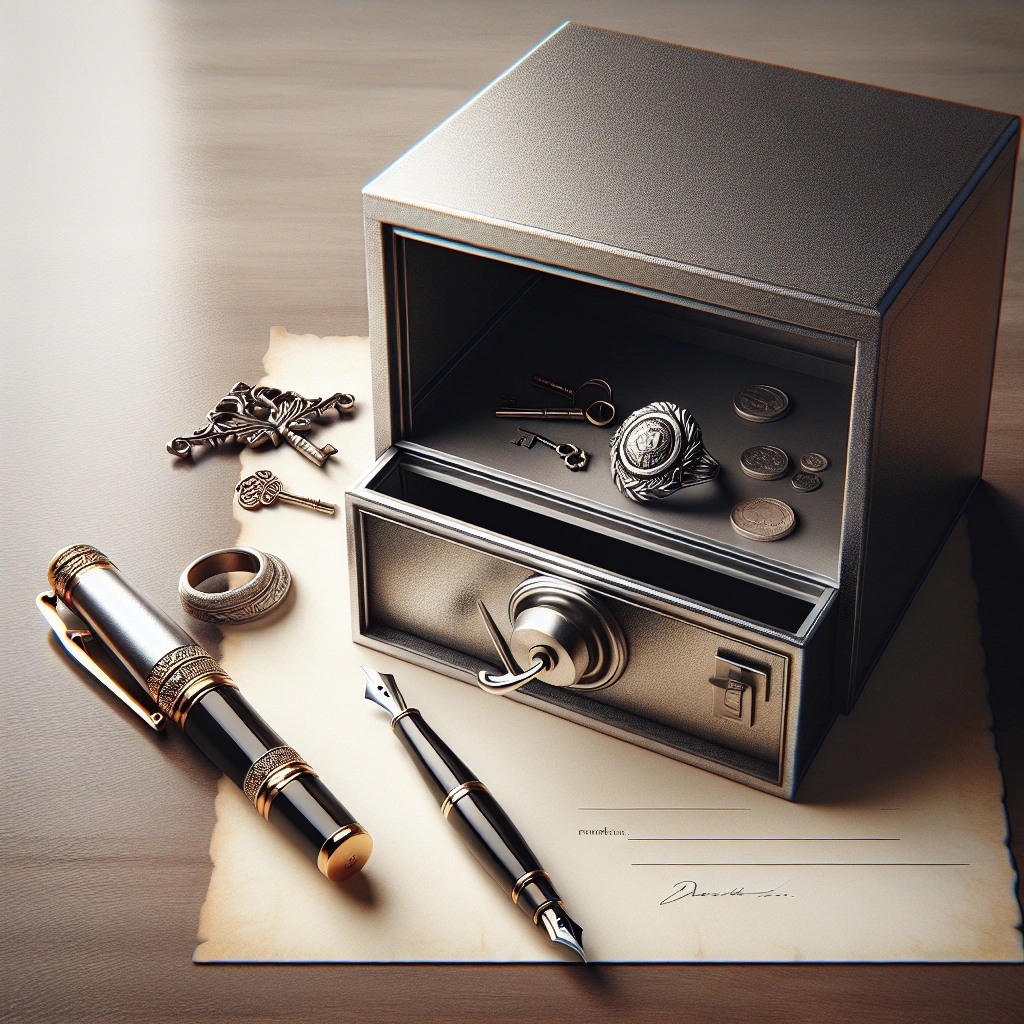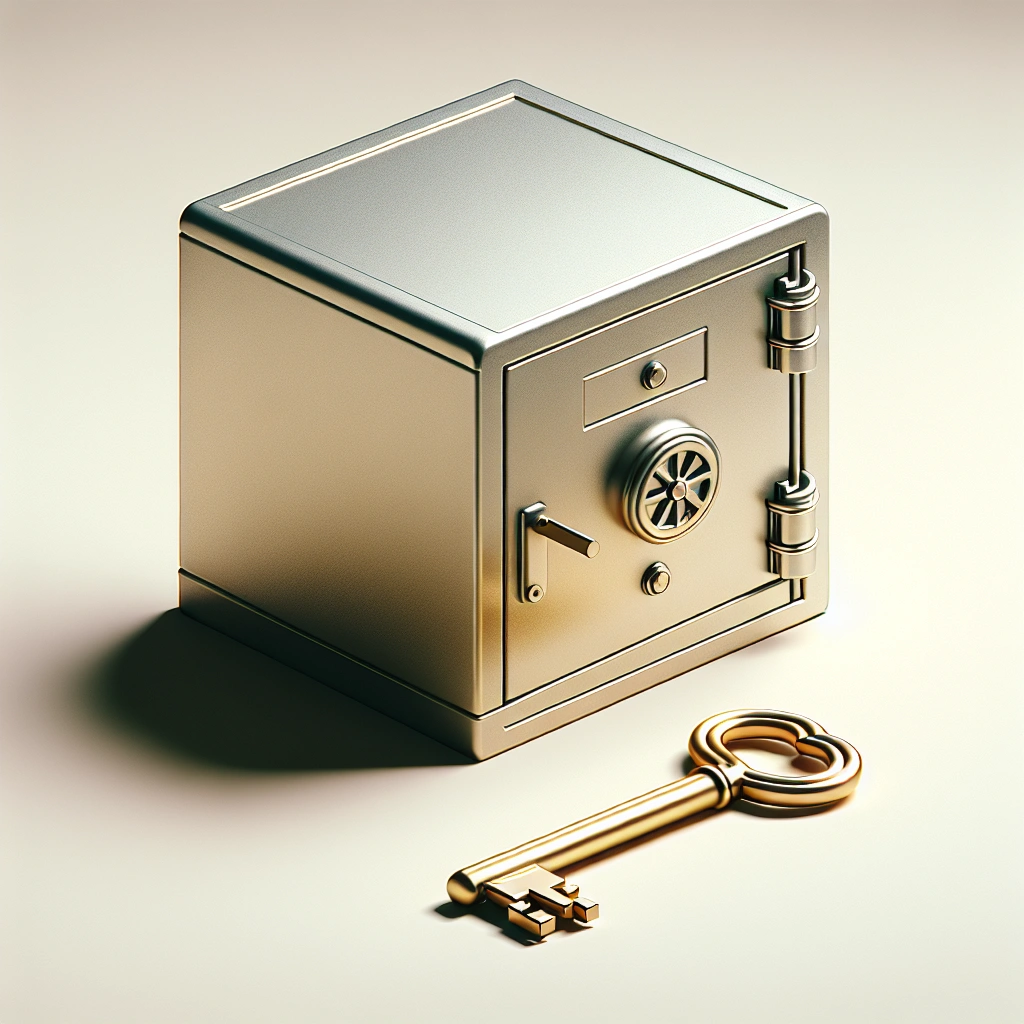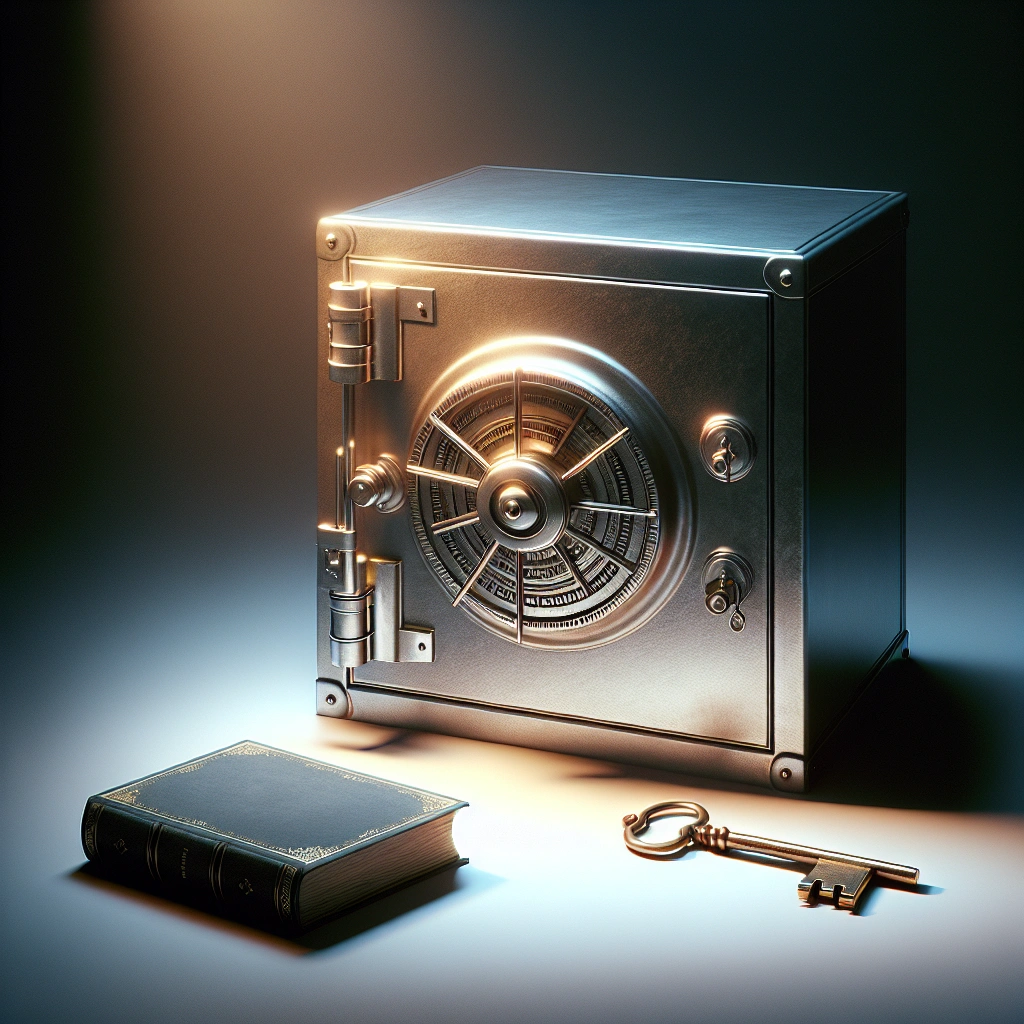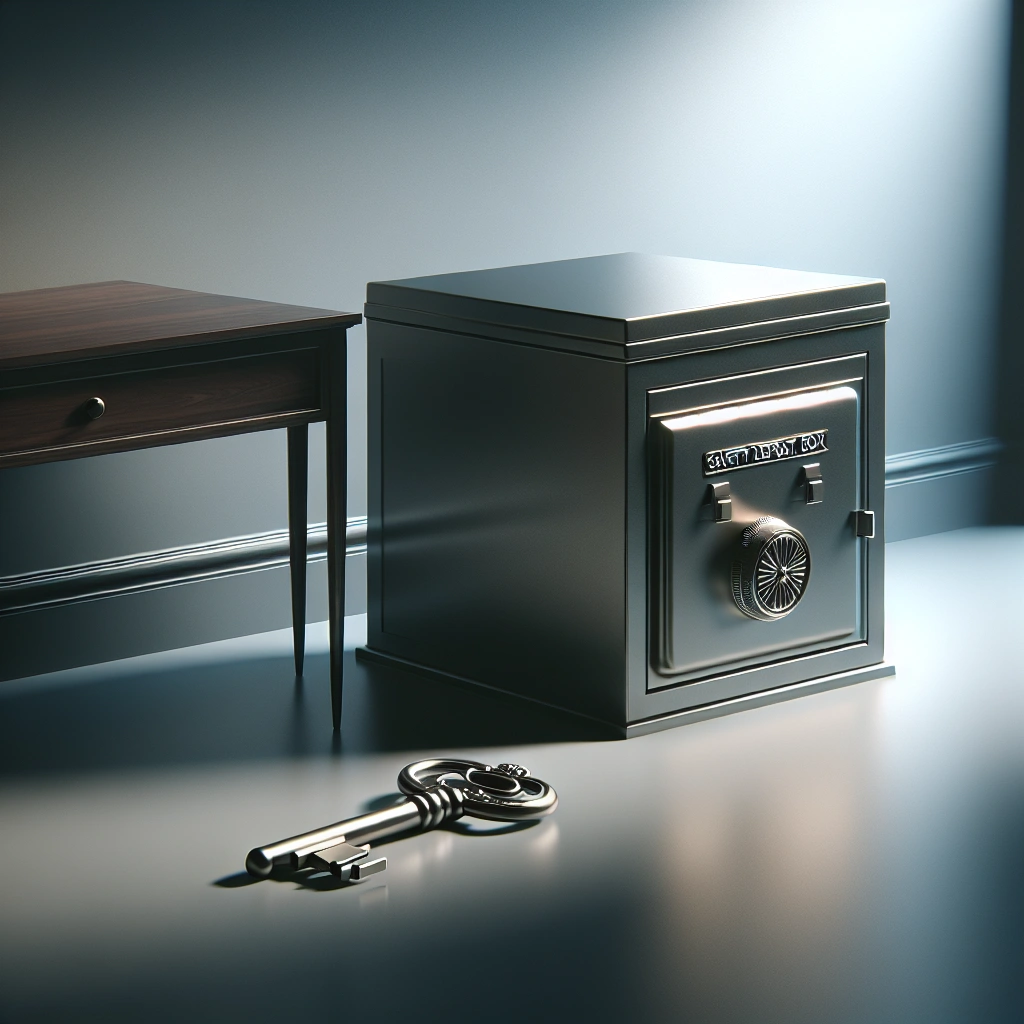Short Answer for What Happens to a Safety Deposit Box When Owner Dies?
The safety deposit box becomes inaccessible until the probate court authorizes an executor or administrator to access it, because the bank requires official proof of authority to allow entry into the deceased’s safety deposit box.
What happens to a safety deposit box when the owner dies? It’s a question wrapped in a veil of mystery and legal jargon, touching on loss and the bureaucratic aftermath that follows. Knowing the destiny of a deceased loved one’s most securely kept treasures and documents compels us to navigate through a maze of legal procedures.
Upon the owner’s death, a safety deposit box transforms from a private sanctuary of valuables into a legal entity that beckons for clear, procedural accession. Entrance is granted only to authorized individuals, equipped with the necessary judicial endorsements and proofs of identity. This process, inherently mingled with the emotions of loss, underscores the necessity of understanding and preparing for the eventual handling of these secure repositories.
Facing this task requires more than just a key; it invites a journey through probate courts, legal documentation, and potentially the consultation of legal professionals. The steps to access the contents legally and ethically emphasize the importance of readiness and respect for the decedent’s legacy. Let’s delve into deciphering this process together, ensuring clarity, compliance, and a smooth transition during such a pivotal time.
-
Access is initially granted to the executor or administrator, who must present a certified copy of the death certificate and a letter from the probate court.
-
The probate process is essential for legal access to the safety deposit box, potentially delaying access until official executor recognition.
-
Bank supervision is required when opening the safety deposit box, ensuring legal compliance and proper inventory of the contents.
-
Consulting with legal professionals is advisable to navigate the complexities of accessing the safety deposit box post-mortem.
-
Proper documentation, such as death certificates, letters from executors, and proof of identity, is crucial for legal access to the contents of the safety deposit box.

How to Open a Safe Deposit Box After Death
When someone amazing passes away, they might leave behind a little mystery box, folks – a safe deposit box. This box might be packed with secret treasures or important papers.
Here’s how we crack that box open – legally, of course.
Identify the location of the Box holding Decedent’s Assets to open after death
First off, we’ve got to pinpoint where this treasure chest is hiding. This could feel like you’re on a treasure hunt, except the map is made up of the deceased’s financial records. You should start by digging through their paperwork, looking for any bank documents. If you’re hitting a wall, try contacting their attorney or just go ahead and visit the banks where they were known to hoard their gold. More about this can be found right here.
Obtain Permission from the Court to access the contents
Next up, we need to get the keys to the kingdom, and that means getting the court’s blessing. You’ll need a certified copy of the death certificate and either a letter from an executor or an affidavit proving you’re the chosen one to access this hidden vault. It’s like getting a secret passcode. But remember, with great power comes great responsibility, and in this case, paperwork. For a deep dive into this process, you might want to check out these instructions.
Review and Retrieve the Contents of the Safe Deposit Box
This is the moment we’ve been waiting for, folks – cracking open the box. Once you’re inside, take inventory. You might find anything from wills to insurance policies, or maybe even a map leading to more treasure. But it’s not just about the loot; there’s probably important stuff in there that needs to be handled with care. Make sure to keep detailed records of what you find to make the probate process smoother than a gravy sandwich.
For those who need a bit more guidance or hit a snag along the way, it might be wise to seek out a savvy legal mind. You can find some of the sharpest legal eagles ready to help over at Your Legacy Legal Care.
Opening a safe deposit box after someone has passed away is not just about digging through their belongings. It’s a process, folks – one that involves respect, legality, and a bit of detective work.
But by following these steps, you’ll manage to unveil the secrets held within without getting into hot water. Make sure to tread carefully, respect privacy, and always, always follow the legal route.
Happy treasure hunting!

What happens to a safety deposit box when owner dies?
When the owner of a safety deposit box dies, the box typically becomes inaccessible until the probate court recognizes an executor or administrator of the estate. This designated individual must then provide the bank with essential documents, such as a certified death certificate and a letter from the probate court authorizing their appointment, to gain access to the box, often under bank supervision. The process, governed by legal and probate proceedings, requires patience and proper documentation, ensuring that only authorized parties can access the contents of the safety deposit box following the owner’s death.
Legal procedures to grant access to the rightful heirs or executors
When the owner of a safety deposit box passes away, let me tell you, it’s not as simple as just going in and grabbing what’s yours. No, no, it’s much more complicated, but we’re going to win this, okay? First, access is typically granted to the executor or administrator of the estate. This person must provide a range of documents including, but not limited to, a certified copy of the death certificate and a letter from the probate court approving their appointment (Your Legacy Legal Care).
In some cases, a financial institution might allow access to remove the will or burial plot deed under supervision but let’s be clear, taking anything else out without the correct paperwork, it’s a huge no-no.
Probate process and its impact on the safety deposit box access
The probate process – oh, it’s huge, folks. It plays a critical role in granting access to the safety deposit box.
It’s like the gatekeeper. Until the probate court officially recognizes someone as the executor, the contents of the box are like Fort Knox.
During this period, banks typically seal the box, meaning no one can access it until the court issues those magic words, or rather, documents giving the green light. This could take weeks, months, or with probate, as we know it, even longer.
It’s a slow process, believe ME.
However, once the executor is recognized and provides the necessary documentation to the bank, including that all-important certified copy of the death certificate and the letter from the probate court (Hilton Head Estate Planning), the box can be opened. And let’s not forget, this has to be under the supervision of a bank official – it’s very official, very important.
Remember, folks, navigating through the legal and probate process requires patience, the right documents, and sometimes the tenacity of a bull. It’s not for the faint-hearted, but it’s how the system works.
And we’re going to make the system work for us, aren’t we?
To sum up, when someone says, “What happens to a safety deposit box when the owner dies?” You tell them, it’s locked down tighter than a maximum-security prison. But with the right legal paperwork and a little bit of that Trump tenacity, the rightful heirs will gain access.
It’s all about being prepared, staying informed, and playing by the rules. Let’s do it!

Legal Resources and Consultation for Accessing Safe Deposit Boxes
When someone says “what happens to a safety deposit box when the owner dies,” they’re not just throwing out a casual question. They’re delving into one of the great mysteries of the banking and legal world.
And folks, let me tell you, the answer is not as simple as “You just open it up and take what you need.” Far from it. So, let’s get down to business and talk about how you go about this the right way, the best way, believe ME.
Schedule A Consultation Today to understand post-mortem safe deposit box procedures
First things first, scheduling a consultation with a legal expert who knows what they’re talking about is key. I’m talking about seasoned professionals who’ve been in the trenches and come out swinging, understanding every twist and turn of post-mortem safe deposit box procedures.
Here’s what you’ll learn in a nutshell:
- You’ll need a certified copy of the death certificate. It’s absolutely essential, no getting around it.
- Then, there’s a letter from the executor or administrator chosen by a probate court, which is basically like getting the golden ticket.
- An affidavit proving your identity also comes into play. It’s not just saying “I am who I say I am.” It’s proving it, big league.
Contact The Firm for detailed estate planning and box access post-mortem
You’ve got questions, they have answers. Contacting a firm well-versed in estate planning and navigating the complexities of accessing a safety deposit box after the owner takes that final limo ride to the sky is crucial.
-
What to bring? Your meeting checklist should be packed.
We’re talking existing legal documents like wills, trusts, proof of identity, and the whole enchilada.
-
Preparing for this meeting? Think ahead, way ahead.
Consider what you want to happen if you’re too sick or incapacitated to make decisions. It’s like planning for an election you might not win, but you gotta have a strategy.
Folks, remember, when it comes to dealing with safety deposit boxes after someone has passed away, you’re not just tossing a coin and hoping for the best. You’re navigating a legal labyrinth that requires knowledge, patience, and the right team of experts.
And let me tell you, with the right advice, you’ll not only manage to access that box, but you’ll do it knowing you’ve covered all your bases, legally and securely.
For those looking to deep-dive into understanding these procedures and ensuring you have the right documents and information at your fingertips, consulting with a firm that specializes in this kind of work is not just good-it’s the best, absolutely terrific advice I can give. Remember, in the world of legal matters, knowledge is power.
Tremendous power.
And, in case you’re wondering where to find more information or how to prepare for these legal ventures, don’t hesitate to visit Your Legacy Legal Care and get in touch with the experts who know how to handle these situations better than anyone. Trust me, you won’t regret having professionals by your side in these delicate matters. It’s like choosing the right caddy for the toughest golf course. They might just help you score a hole-in-one in the complex game of post-mortem legal proceedings.
| Step | Action Required | Documents Needed | Purpose |
|---|---|---|---|
| 1 | Schedule A Consultation | N/A | To understand post-mortem safe deposit box procedures |
| 2 | Obtain a certified copy of the death certificate | Certified copy of the death certificate | Essential for proceeding with legal actions |
| 3 | Get a letter from the executor or administrator | Letter from executor/administrator chosen by probate court | Acts like a golden ticket for legal permissions |
| 4 | Provide an affidavit proving your identity | Affidavit proving identity | To verify you are who you claim to be in legal terms |
| 5 | Contact The Firm for estate planning and box access | Legal documents (wills, trusts), proof of identity | To navigate complexities of accessing the safety deposit box post-mortem |
| 6 | Prepare for the meeting with the firm | Existing legal documents, proof of identity | For a well-prepared estate plan and to ensure smooth access to the safety deposit box |

Ensuring Your Legacy: Actions to Take Now
To ensure your legacy and the smooth transition of assets within your safety deposit box, it’s essential to take proactive steps now. First, regularly review and update your estate planning documents to reflect current laws, relationships, and wishes, specifying who can access the box after your passing. Next, document the location and access details of your safety deposit box, assign a trusted individual as a deputy or co-owner for immediate access, maintain an up-to-date inventory of its contents, and include specific instructions in your legal documents to avoid confusion and conflict among heirs, ensuring your assets and memories are preserved and passed on as you intend.
Why updating estate planning documents is crucial for safety deposit box owners
Updating your estate planning documents is not just important, it’s absolutely crucial for safety deposit box owners. Think about it.
Not doing so is like saying, “I’ve built this incredible, luxurious hotel – the best you’ve ever seen. But, you know what?
I’m not going to maintain it. Let’s see how that works out.” Spoiler: It doesn’t work out well.
When you have a safety deposit box, you’re holding onto assets, memories, maybe even the most fabulous collection of vintage ties. But if you don’t update your estate documents? It’s like you never built that hotel. Without updating, your wishes may not be honored, and accessing the contents of your safety deposit box could become a legal nightmare for your heirs. For more nightmare-avoidance tactics, consider peeking at lawyer-monthly’s insights.
To make it crystal clear, here’s what you need to do:
-
Review your estate plan regularly. Laws change, relationships change, and your estate plan should change too.
-
Clearly specify who has access after you’re gone. This is about making sure your vintage tie collection goes to the right person.
-
Consider the laws of your state. Some states have specific requirements about accessing safety deposit boxes after death, so you want to make sure you’re compliant.
Pre-death planning to ease the transition and access for heirs and benefactors
Now, let’s talk strategy for pre-death planning, because it’s basically putting on your best suit before you negotiate – it sets you up for success.
-
Document location and access details. Make sure someone knows where to find your safety deposit box and, more importantly, how to access it. This is critical for avoiding those awkward “I know there’s a box but…” conversations.
-
Nominate a deputy. You know how the president has a vice? You need something similar for your safety deposit box. Assign someone you trust as a co-owner or give them legal permission to access in case something happens to you.
-
Keep an inventory. What’s in the box? Keeping a detailed list helps ensure that nothing gets overlooked during the transition – because overlooking your collection of rare coins would be a tragedy.
-
Legal ease. Make sure your legal documents, like your will and power of attorney, specifically mention your safety deposit box and your wishes for it. This simplifies everything immensely.
-
Communicate. Have a clear, direct discussion with your heirs or benefactors about your safety deposit box, its contents, and your wishes. This transparency can reduce confusion and conflict later.
Here’s a table to help you visualize the steps for ensuring access:
| Step | Action | Reason |
|---|---|---|
| 1. | Document location and access | Avoids confusion |
| 2. | Nominate a deputy | Ensures immediate access |
| 3. | Keep an inventory | Prevents oversight of assets |
| 4. | Include in legal documents | Legal clarity and compliance |
| 5. | Communicate with heirs | Reduces potential conflict |
Ensuring your legacy is about making sure your meticulously collected assets, be they financial or sentimental, are passed on according to your wishes. It’s also about making it as straightforward as possible for your loved ones to navigate what will undoubtedly be a challenging time.
By taking these steps now, you’re basically doing everyone a huge favor. And let’s face it, it’s a brilliant move.
Like the kind of move that gets buildings named after you. So, get on it, and ensure your legacy is as legendary as it ought to be.

Conclusion
When the owner of a safety deposit box passes away, the process to access its contents involves several legal steps. Initially, the estate’s executor or administrator must provide the necessary documents, such as a certified death certificate and approval from the probate court, to the bank. This ensures that access to the box is granted legally and appropriately.
During the probate process, the bank typically seals the safety deposit box, preventing access until the court recognizes an official executor. This phase can be lengthy, requiring patience and meticulous adherence to legal requirements. The involvement of a legal professional or consultant during this time could be crucial in navigating the complexities of estate and probate laws.
To smooth the transition and access after the owner’s death, having up-to-date estate planning documents is critical. This not only simplifies the process for heirs but also ensures the owner’s wishes are respected and followed. Engaging with legal experts in estate planning can provide guidance and peace of mind in handling these sensitive matters, securing the owner’s legacy and assets for future generations.
